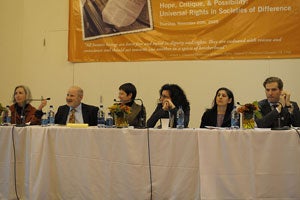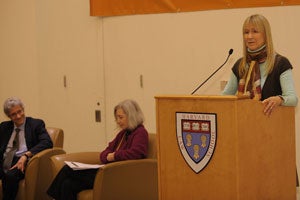On Nov. 20, Harvard Law School and Facing History and Ourselves co-sponsored a conference, “Hope, Critique & Possibility: Universal Rights in Societies of Difference,” to mark the 60th anniversary of the Universal Declaration of Human Rights.
At the day-long conference—which brought international scholars from education, law and human rights, as well as students, teachers, and community leaders to HLS—panel discussions focused on the global impact of the declaration as well as the challenges to fulfilling its purpose. View slideshow here.
Facing History is an organization dedicated to providing resources for teaching civic responsibility, tolerance, and social action and inspiring young people to take responsibility for their world, with an emphasis on studying the historical development and lessons of the Holocaust and other examples of genocide. The organization works with a network of educators, adjunct faculty, and international fellows and facilitates hundreds of seminars, workshops, and public events each year.
The Universal Declaration of Human Rights, adopted and proclaimed on Dec. 10, 1948, is a set of international standards to protect individual freedom, human dignity, and the life chances of each person.
“Sixty years after the drafting of the Universal Declaration of Human Rights, its aspiration to promote ‘understanding, tolerance, and friendship among all nations, racial or religious groups’ has new urgency but also complexity within nations that are now more diverse than ever,” said Conference Co-chair Martha Minow, Jeremiah Smith, Jr. Professor at Harvard Law School. “Devising classrooms, workplaces, family law regimes, refugee policies, and counter-terrorism practices that reach toward this goal provokes distinctive challenges for lawyers, educators, and citizens whether in the suburbs of Paris, Duisberg, Germany, or Lewiston, Maine.”
Margot Stern Strom, conference co-chair and executive director of Facing History and Ourselves, opened the conference with a video interview with HLS Professor Mary Ann Glendon, author of “A World Made New: Eleanor Roosevelt and the Universal Declaration of Human Rights.” Glendon, who is currently the U.S. Ambassador to the Holy See at the Vatican, said that the document originated with an international gathering of philosophers convened by the U.N. to draw up a list of fundamental principles. The resulting Declaration, signed by countries all over the world, “was really not about enforcement, it was about inculturation,” she said. View the story and video.
Jacqueline Bhabha, lecturer at HLS and executive director of the Harvard University Committee on Human Rights Studies, addressed the conference in a talk titled “The Fourth Pillar: Education and a Right to a Future.” Bhabha, whose academic work focuses on the rights of children, based her discussion on Article 26 of the Universal Declaration of Human Rights, which says education is a basic human right. She offered examples where access to education is a challenge, especially in post-conflict settings such as Sierra Leone, and talked about her experiences working with children in impoverished areas around the world. View the webcast here.
Adam Strom, director of research and development at Facing History and Ourselves, moderated a panel titled “Educating in Diverse Societies,”with panelists Sir Keith Ajegbo, a former head teacher of Deptford Green School in the United Kingdom; John R. Bowen, a professor at Washington University in St. Louis; Viola Georgi, a professor of intercultural education at Freie Universität Berlin; Marcelo Suárez-Orozco, a professor at New York University’s Steinhardt School of Culture, Education and Human Development; and Patrick Weil, a senior transatlantic fellow at the German Marshall Fund. Discussion focused on what equal opportunity means in diverse schools. What’s happening in schools with high and diverse immigrant populations. And do schools with diverse student bodies encourage development of one common identity or instead foster distinctive group identities? View the webcast here.

In a panel titled “Universality and Identity or Confrontation and Aspiration in what is called an Age of Terror and Globalization,” Minow moderated a discussion with Jocelyne Cesari, an associate in the Center for Middle Eastern Studies at Harvard; HLS Professor Noah Feldman; Maleiha Malik, a lecturer in law at King’s College London; Richard Shweder, William Claude Reavis Distinguished Service Professor of Human Development, University of Chicago; and Ayelet Shachar, a law professor at the University of Toronto. The panelists discussed how identity issues have shaped their respective countries’ public policies in the wake of terrorism and other crimes that frequently target specific ethnic groups. View the webcast here.
Samantha Power ’99, a professor at Harvard’s Kennedy School, discussed her new book “Chasing the Flame,” a biography of Sergio Viera de Mello, a Brazilian-born United Nations official killed in 2003 by a bomb at the UN’s Baghdad’s headquarters in Iraq. In her talk, Power addressed the question of what can we learn from a life spent acting on humanitarian commitments while accommodating political realities. She offered Veira de Mello’s life and career as an example. The United Nations is often unfairly blamed for failures to protect the vulnerable or deter aggression, when the real failure is that of the great powers standing behind it, she argued. View the webcast here.
During lunch, there were ten break out sessions for small group conversations with experts in the field of human rights. Several sessions were led by HLS professors, including “The Changing Nature of Wars and the Changing Nature of Laws,” with Professor Gabriella Blum; “Teaching the Practice of Human Rights: Engaging Law Students Critically,” with Professor James Cavallaro: “Bargaining with the Devil: The Challenge of Negotiating with Adversaries You See as Evil,” with HLS Professor Robert Mnookin; and “International Criminal Prosecutions and Universal Human Rights,” with Professor Alex Whiting.
